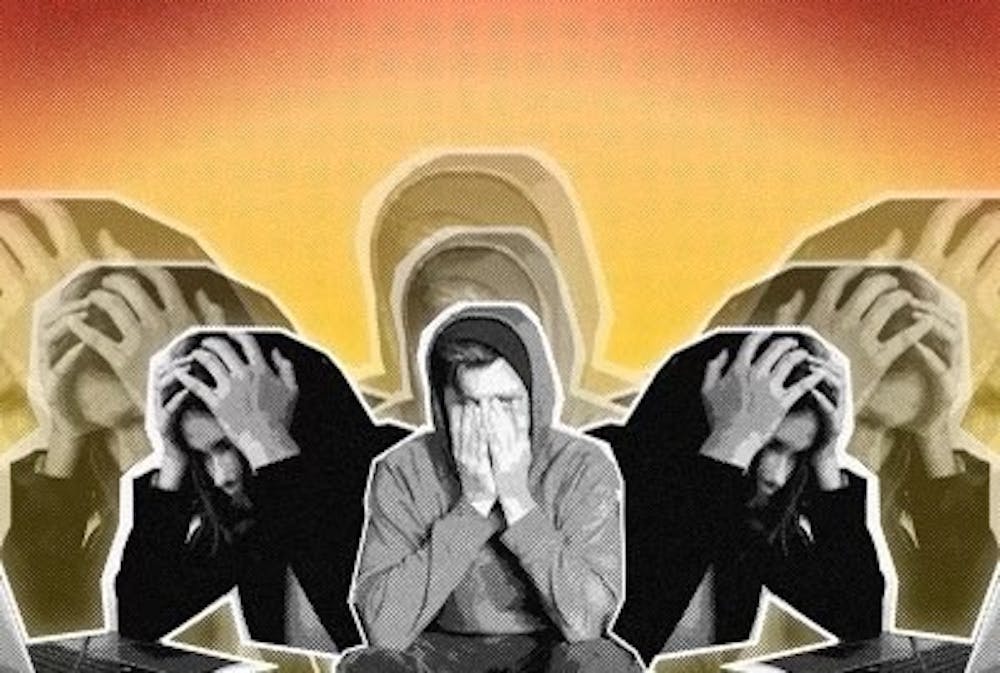The 2021-22 school year at Miami University has seen both a decrease in the number of students going through the Office of Community Standards for behavioral related conduct violations and an increase in mental health cases among students.
It’s too early to tell whether these trends are related, but Miami is working to make sense of this information.
The Student Counseling Service (SCS) has seen an uptick in the number of students requesting appointments, with some students waiting weeks before they can see a clinician.
The SCS provided 504 individual counseling appointments in August and 1,241 in September, up from 400 and 887 appointments in August and September of 2020, respectively.
John Ward, director of SCS, said part of this upsurge could be due to the return of in-person counseling sessions. While virtual sessions were used last year and are still available this year, the strictly online format last year may have deterred students from seeking counseling.
“I would say about 90% of students prefer to do their services face-to-face,” Ward said. “There’s some people who really benefit from telehealth, but the vast majority of students are doing it face-to-face at this point.”
Ward said other factors like the pandemic, politics and stress around returning to a fully open campus are also influential.
“Students aren't showing up saying that’s why they’re seeking services, but it sort of weighs on all of us,” Ward said. “It's another stressor that's adding to the full load that many of us are carrying.”
Delays caused by the high volume of students have been exacerbated by staffing issues. Ward said recruiting staff has become more challenging now that workers have more leverage as a result of the labor shortage.
“Universities are going to have to catch up with what the salary demands are,” Ward said. “Until they do that, there's going to be a struggle in terms of recruiting therapists to work in counseling services.”
Ward said that even if SCS were fully staffed, the demand for appointments would still exceed supply.
“I don't know if we have the capacity to hire enough clinicians to get us out of that trend,” Ward said.
Enjoy what you're reading?
Signup for our newsletter
Alongside the upward trend in mental health needs among students is a downward trend in the number of Community Standards incidents.
As of the end of October, there were 276 incidents this academic year, with the highest numbers of these incidents being related to alcohol violations and false identification.
Incidents of academic dishonesty are down from both last year and the year before. At the end of October, there were 121 reports of academic dishonesty, compared to 230 at that time in 2020 and 160 in 2019.
Gabby Dralle, interim director of the Office of Community Standards, said that while reports are down from previous years, the office has seen an increase in the number of “students of concern.”
The Dean of Students (DOS) Office allows professors and peers to report a student of concern when a student “exhibits behaviors that indicate distress, cause a disturbance in the community and/or present a danger to oneself or others,” according to Miami’s website.
“Students who are struggling, whether that be with their mental health or general well being, we are seeing quite a significant increase in that for our students,” Dralle said.
The rise in student of concern reports are further evidence of the ongoing mental health crisis at Miami, but whether they are linked to the low number of behavioral incidents remains uncertain.
“It's definitely something that could be impacting student behavior,” Dralle said. “Things are still happening on our campus, but it is really mental health and wellbeing that is of great concern right now.”
Various offices at Miami are working to address these trends and find ways to support students. Ward said the SCS is looking toward a stepped treatment model that tries to match the scale of intervention with a student’s level of need.
“A stepped care approach looks at a wide range of mental health interventions that go beyond just what SCS is going to provide,” Ward said. “It looks more holistically at health and wellness.”
Ward said this model could combat the patient-counselor imbalance by directing students to other services that may be more beneficial for them, such as group therapy or the Office of Student Wellness.
“What we don't want to do as a university system is think, ‘Someone is experiencing some level of emotional distress, they absolutely need to be at the counseling center,’” Ward said. “We look at what service actually meets the particular need of a student and don’t just assume there’s a one-size-fits-all and everyone has to be in individual counseling.”
Dralle said the DOS office has also taken steps to ensure that students who go through its office get in touch with the right campus services.
“Obviously students are connected to the [Office of Community Standards] because something has happened, but we try to provide support and make sure we’re equipped to get them connected to resources on or off campus,” Dralle said.
Dralle said the university is working to make students more aware of the resources it offers to address the mental health situation.
“When students are struggling, the first and good thing they think of is to get into counseling appointments, which is a very important part of their care,” Dralle said. “But there are other things that students can do and that we can do as a university to support our students.”




